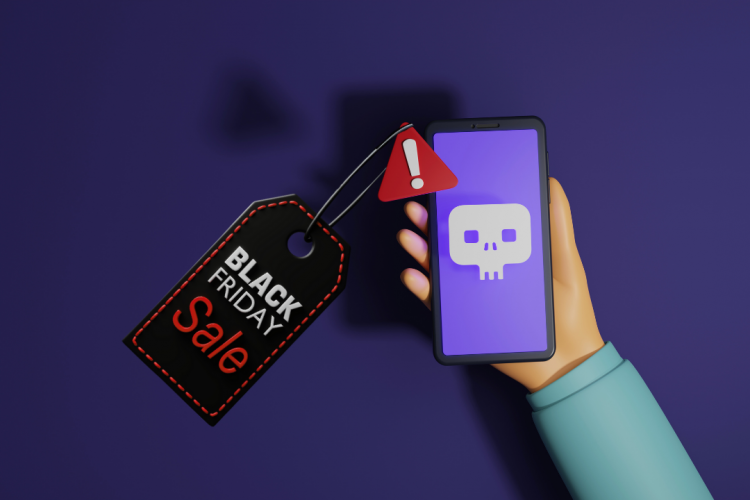As Black Friday continues to grow in scale and significance, it’s no surprise that the event is becoming a prime target for cyber criminals. With billions of pounds spent annually on shopping, the stakes are higher than ever – both for businesses and consumers.
According to the National Cyber Security Centre (NCSC), the holiday shopping period has become a “prime time” for scams. Scammers increasingly use advanced tools, including artificial intelligence, to create highly convincing and scalable frauds. In the 2023 festive season alone, online scams in the UK cost consumers over £11.5 million, nearly £1 million more than the previous year.
How Scammers Operate
Fraudsters deploy a variety of tactics during Black Friday:
- Fake Listings: Fraudulent offers of high-end tech or branded clothing frequently appear on social media, luring unsuspecting shoppers.
- Social Media Exploitation: 43% of fraud reports to Action Fraud between November 2023 and January 2024 were linked to social media platforms.
- AI-Powered Scams: AI-generated emails and advertisements are making fraudulent schemes harder to detect, fooling even cautious consumers.
Each victim of online shopping fraud lost an average of £695 between November 2023 and January 2024, with the total number of incidents exceeding 16,000 over the same period. Online marketplaces also saw a significant number of mentions in scam reports, accounting for nearly 19% of all cases.
With the scope of Black Friday promotions now spanning several weeks, shoppers are expected to spend £365 each on average this year, up from £300 in 2023. Telecoms provider Three reported an increase in scam activity around Black Friday, with nearly 3,500 scam messages reported daily during last year’s sale period. This year, the volume of scam messages received monthly is already 170,000 higher compared to 2023.
Why Black Friday Is a Cyber Crime Magnet
Black Friday’s unique dynamics make it particularly attractive to attackers:
- Massive traffic surges: Retail websites experience traffic spikes, making it easier for malicious activities to blend in unnoticed.
- Rushed operations: Retailers rushing to implement last-minute updates or manage promotions often leave vulnerabilities unpatched.
- Consumer urgency: The fear of missing out (FOMO) drives shoppers to act impulsively, often ignoring basic online safety practices.
How Businesses Can Mitigate Black Friday Cyber Security Risks
To safeguard your company and customers, consider implementing these key strategies:
- Keep Critical Systems Updated
Regularly install security patches to close known vulnerabilities. Cyber criminals often exploit outdated software to gain access to systems. - Monitor Applications and Systems
Deploy advanced monitoring tools to detect and respond to threats in real time. Use endpoint detection and response (EDR) or Security Information and Event Management (SIEM) solutions to enhance visibility. - Establish an Incident Response Plan
Create a clear incident response protocol that outlines roles and responsibilities during a breach. Ensure your organisation has adequate cyber insurance to mitigate financial losses. - Train Employees Regularly
Cyber security training is critical for your team, especially during high-risk periods. Teach employees how to spot phishing attempts and maintain secure practices. - Ensure Payment Security
If you process transactions, comply with the PCI DSS standard. Offer secure payment options to reassure customers of their safety.
Cyber Security Tips for Online Shoppers
Consumers play a significant role in securing their online transactions. Here’s how to stay safe while hunting for deals:
- Use Strong Passwords and MFA
Secure your accounts with unique passwords and enable multi-factor authentication (MFA) whenever possible. This adds an extra layer of protection. - Shop Only on Secure Websites
Look for HTTPS in the website URL and check for clear security policies. If the site seems suspicious, avoid it. - Avoid Phishing Scams
Be wary of emails or ads offering “unbelievable” deals. Verify URLs before clicking and avoid entering personal information on unfamiliar sites. - Stick to Secure Networks
Avoid shopping on public Wi-Fi networks, which are more susceptible to attacks. Use a Virtual Private Network (VPN) if you need to connect while on the go. - Scrutinise Deals Carefully
Deals that sound too good to be true usually are. Double-check the retailer’s legitimacy before proceeding.
Black Friday should be about scoring great deals, not becoming a victim of cybercrime. For businesses, protecting customer data and maintaining operational resilience is critical, while shoppers should adopt a security-first mindset.
By staying informed and vigilant, we can all enjoy a safer Black Friday. Contact OmniCyber Security today for help with your business cyber resilience this holiday season.




